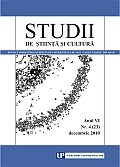FUNDAMENTELE MATERIALE ALE UTOPIEI BACONIENE
THE MATERIAL FOUNDATIONS OF FRANCIS BACON’S UTOPIA
Author(s): Guido GiglioniSubject(s): Literary Texts
Published by: Editura Universităţii Vasile Goldiş
Keywords: knowledge; Solomon’s House; natural appetites of matter; secret motion of things; cunoaştere; Casa lui Solomon; apetitele naturale ale materiei; mişcări secrete ale lucrurilor.
Summary/Abstract: In the unfinished tract New Atlantis, published posthumously in 1627, Francis Bacon describes an ideal community, called Bensalem, in which the political and religious establishment takes care of facilitating the advancement of learning in all its various forms. While describing Salomon’s House’s aims, Bacon defines the purpose of this ‘foundation’ as ‘the knowledge of causes, and secret motions of things’. In this essay, I will explore what Bacon meant by ‘secret motions of things’ and more importantly, the link that he established between the knowledge of the secret motions of things and the possibility of transforming reality in an infinite number of ways (‘the effecting of all things possibile’). From other works of Bacon, including the renowned Novum organum, we learn that he thought of these hidden motions as a limited number of primordial appetites in matter (Novum organum, II, aph. 48). Bacon was of the opinion that the existence of appetitive drives inherent in matter represented the defining characteristic of both the natural and the human world. It is through knowing and subduing the appetites of matter that man can have some hope of mastering the intractable forces of nature and restoring a type of humankind in control of its appetites – i.e., the original paragon of cognitive and moral perfection embodied by the pre-lapsarian Adam.
Journal: Studii de Ştiinţă şi Cultură
- Issue Year: VI/2010
- Issue No: 04 (23)
- Page Range: 9-17
- Page Count: 9
- Language: English

